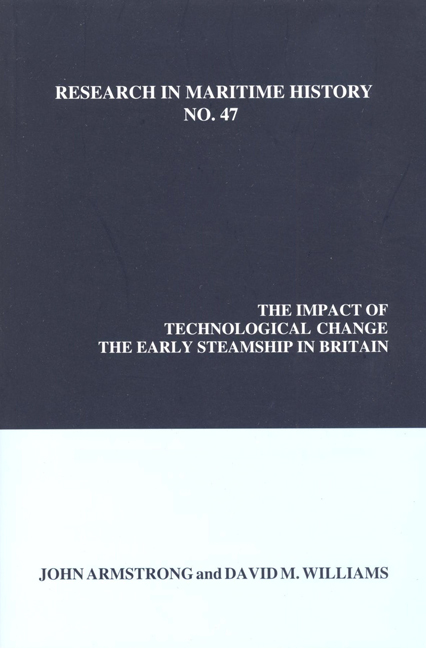Book contents
- Frontmatter
- Contents
- Series Editor's Foreword
- About the Authors
- Introduction
- Chapter 1 British Steam Navigation, 1812 to the 1850s: A Bibliographical and Historiographical Review
- Chapter 2 Some Official Listings of “Vessels Navigated by Steam” in Britain up to 1851: Evidence and Interpretation
- Chapter 3 The Steamboat, Safety and the State: Government Reaction to New Technology in a Period of Laissez-Faire
- Chapter 4 The Steamboat and Popular Tourism
- Chapter 5 The Thames and Recreation, 1815-1840
- Chapter 6 Steam Shipping and the Beginnings of Overseas Tourism: British Travel to North Western Europe, 1820-1850
- Chapter 7 Technological Advance and Innovation: The Diffusion of the Early Steamship in the United Kingdom, 1812-1834
- Chapter 8 The Steamship as an Agent of Modernisation, 1812-1840
- Chapter 9 “A New and Very Modern Business:” The Traffic and Operations of the Early Steamship
- Chapter 10 Promotion, Speculation and Their Outcome: The “Steamship Mania” of 1824-1825
- Chapter 11 The Perception and Understanding of New Technology: A Failed Attempt to Establish Transatlantic Steamship Liner Services, 1824-1828
- Chapter 12 The “Norwich Explosion” of 1817: A Local Tragedy of National Significance
- Chapter 13 Early Steamboat Services and Their Impact in North Wales, 1817-1840s
- Chapter 14 The Beginnings of a New Technology: The Constructors of Early Steamboats, 1812-1822
Series Editor's Foreword
- Frontmatter
- Contents
- Series Editor's Foreword
- About the Authors
- Introduction
- Chapter 1 British Steam Navigation, 1812 to the 1850s: A Bibliographical and Historiographical Review
- Chapter 2 Some Official Listings of “Vessels Navigated by Steam” in Britain up to 1851: Evidence and Interpretation
- Chapter 3 The Steamboat, Safety and the State: Government Reaction to New Technology in a Period of Laissez-Faire
- Chapter 4 The Steamboat and Popular Tourism
- Chapter 5 The Thames and Recreation, 1815-1840
- Chapter 6 Steam Shipping and the Beginnings of Overseas Tourism: British Travel to North Western Europe, 1820-1850
- Chapter 7 Technological Advance and Innovation: The Diffusion of the Early Steamship in the United Kingdom, 1812-1834
- Chapter 8 The Steamship as an Agent of Modernisation, 1812-1840
- Chapter 9 “A New and Very Modern Business:” The Traffic and Operations of the Early Steamship
- Chapter 10 Promotion, Speculation and Their Outcome: The “Steamship Mania” of 1824-1825
- Chapter 11 The Perception and Understanding of New Technology: A Failed Attempt to Establish Transatlantic Steamship Liner Services, 1824-1828
- Chapter 12 The “Norwich Explosion” of 1817: A Local Tragedy of National Significance
- Chapter 13 Early Steamboat Services and Their Impact in North Wales, 1817-1840s
- Chapter 14 The Beginnings of a New Technology: The Constructors of Early Steamboats, 1812-1822
Summary
If successful, long-term collaborations are rare in the broad discipline of history, they have been no more common in maritime history. Perhaps this has a lot to do with the way historians are trained. Unlike in many of the social sciences or many professional fields, postgraduate historical training tends to stress the solitary nature of research and writing. The relative scarcity of successful collaborative work in maritime history makes the essays collected in this volume of special importance. So too is the fact that the authors have let us in on the “secret” to their success. As they admit in the introduction to this book, they not only share similar interests but also “enjoy each other's company.” When professional interests mesh with the personal, these kinds of joint endeavours appear more likely to work.
The partnership between John Armstrong and David Williams has been remarkably prolific over the past decade. But being prolific has its costs - almost inevitably, it leads to the publications spread over a broad swath of journals. One raison d'être for this collection is our desire to make their work more accessible to maritime scholars by bringing this quite remarkable body of scholarship together in a single volume.
Yet this hardly constitutes the only rationale for this edition. As the opening essay makes abundantly clear, the adoption of steam at sea prior to the middle of the nineteenth century has been little studied by previous professional historians. This alone would mark this collection as pioneering. More important, however, the sheer intellectual quality of these essays makes them seminal. Armstrong and Williams have opened up a new field of research, one which they admittedly hope will soon attract a new generation of scholars. We share that aspiration, which is yet another reason why we are excited to have these essays appear as a volume in Research in Maritime History.
For readers new to the reprints in Research in Maritime History, we should point out that all the essays in this book have been completely re-typeset to conform to our standard format. While the content is the same, in the interests of scholarly precision we should note that we have made a few editorial changes. We have standardized the text to accord with the house style of Research in Maritime History.
- Type
- Chapter
- Information
- The Impact of Technological ChangeThe Early Steamship In Britain, pp. xi - xiiPublisher: Liverpool University PressPrint publication year: 2011



